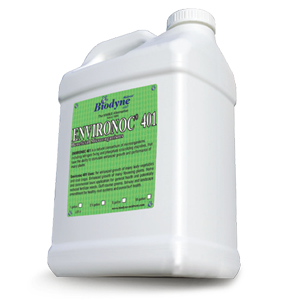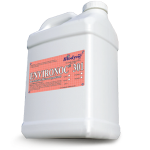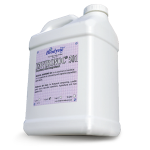Environoc 401

Environoc 401
Dozens of natural beneficial microbes to improve nitrogen fixation, assisting in releasing tied up phosphate and minerals in the soil, stimulates root growth, plant health and soil tilth. It also can be applied in the furrow or through seed treatment.
Capabilities
With a unique and diverse team of beneficial microorganisms present in extremely high counts: ENVIRONOC 401 is a natural consortium of beneficial microbes that are not genetically modified, non-pathogenic, and 100% naturally occurring. The Benefits delivered by this specialized “Team” of viable microbes are diverse and includes the following:
Mineral nutrition enhancement: Nitrogen fixation – there are several different strains that will take in atmospheric nitrogen into their cells and make it available to the plants upon the death of the microbes. —Phosphorus availability – several of the microbial strains have the ability to solubilize otherwise insoluble phosphorus and make it available to the plants
Vitamin production: The presence of microbes that release some vitamins upon their death may contribute valuable nutrients that will benefit the growth of other beneficial members of the root community.
Degradation abilities: Many of the organisms contribute some type of specialized degradation ability to provide nutrients for the growth of the general population in the vicinity of the roots. Cellulose digestion – several strains can digest cellulose and other intermediates which may be sloughed off from the elongating roots through abrasion. Lignin digestion – Depending on the type of plant, there is almost always some lignin component that builds up during root growth. More lignin may be found where mulch is used. Chitin, starch, etc. – other polymeric carbohydrates that can be degraded to simple sugars for the general population Waxes, oils – Plant components that can be degraded to simpler compounds for the general population
Excretory products: molecules released from the microbial cells into their surrounding environment.Besides being very efficient degraders with a superior metabolic pathway, some of the strains release compounds called siderophores that act as iron magnets, that is, they attract iron to be taken into the cells for use in iron-requiring molecules that can also be utilized by the pant. Some of the microbial strains also release hormone or hormone-like products that may mimic those produced by the plants to stimulate growth and other developmental activities important to various parts of the plant.
Surfactant production: Some strains may produce a biological surfactant during growth. Benefits include reduced surface tension to free up more organic and inorganic nutrients may make them more available to the entire microbial population
Residual soil chemicals: Pesticides and herbicides may accumulate in soils. Some of the microbial strains have the ability to degrade pesticides and herbicides that might accumulate in “soils” and later become a problem where susceptible plants are replanted in the same planting mix or soil areas.
Healthy plant roots: the positive end result of the “cloud” of beneficial microbes. Any benefit that ENVIRONOC 401 can contribute to the general health of the plant root may benefit the overall growth of the plant. The general philosophy is to keep a high population of “good guy microbes” in close proximity to the plant roots. This populaion provides a host of benefits including quicker germination, increased root mass, and increased health and vigor of the soil and plant.
Applications
Enhanced growth of many leafy vegetables, row crops, and root crops, Enhanced growth of many flowering plants, Home and commercial lawn application for general health and potentially reduced external fertilizer needs, Golf course greens, fairway and landscape amendment for healthy root systems and potentially reduced external fertilizer needs.
Sizes Sold: 1 Gallon, 2.5 Gallons, 5 Gallons, 55 Gallon, 275 Gallon



